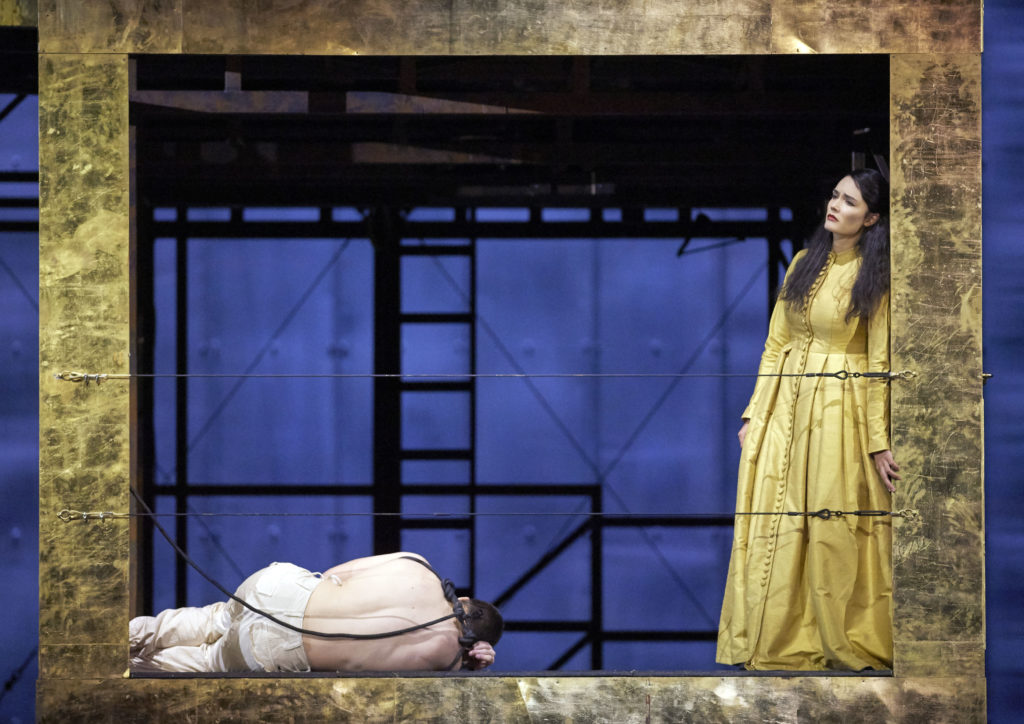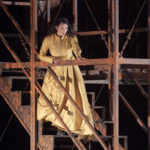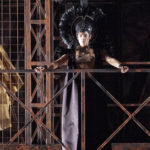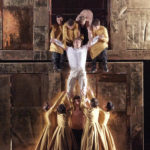 Gluck’s ‘reformation’ opera, departing from the baroque, was enormously influential, anticipating amongst others Mozart. Gluck strove for opera cleansed of unnecessary virtuoso showpieces, extended coloratura, technical bravura. Music should serve the text and plot, opera be true and simple, avoiding distractions.
Gluck’s ‘reformation’ opera, departing from the baroque, was enormously influential, anticipating amongst others Mozart. Gluck strove for opera cleansed of unnecessary virtuoso showpieces, extended coloratura, technical bravura. Music should serve the text and plot, opera be true and simple, avoiding distractions.
But Ivan Alexander’s production of Armide for Vienna State Opera – the first in 124 years- is controversial. Armide usually seen as the seductive sorceress, is cast as young man dressed as beautiful woman; and used as a sex trap by the Muslim side against the crusaders. A fantasy creation to confuse foreign Christian soldiers, (as, historically, men were lured by spies into love affairs.)
 The Vienna State Opera stage is a labyrinth of cages, grid-like boxes connected by staircases. On the top level, a figure in black, a soldier, stands guard. Armide, (mezzo Gaëlle Arquez), a brunette with long flowing hair, wearing a gold gown, descends the stairs. She is seen making love to a blonde soldier, who’s whisked away, his head covered in a black hood. She pulls off her wig ; now with short-cropped hair, leans against the stage, sullen. Why are you so sombre on this glorious day, sings her maid, Phénice the magnificent soprano Olga Bezsmertna. Armide need fear nothing: the power of her eyes sufficed to weaken Godfrey’s regiment. Yet, she sings , she cannot subdue Renaud, whom she despises. He remains indifferent; her humiliation would be terrible if she cannot conquer him. Phénice advises, forget him: against her magical powers, he will be defenceless. Arquez sings of a recurrent dream in which she wins him: an inexplicable spell makes her loveable, her heart pierced. Arquez, intense, brooding with dark passion, yet with a faultless clarity of intonation. A drum roll – extraordinary pitch- emitted by Les Musiciens du Louvre’s original instruments, conducted by Marc Minkowski.
The Vienna State Opera stage is a labyrinth of cages, grid-like boxes connected by staircases. On the top level, a figure in black, a soldier, stands guard. Armide, (mezzo Gaëlle Arquez), a brunette with long flowing hair, wearing a gold gown, descends the stairs. She is seen making love to a blonde soldier, who’s whisked away, his head covered in a black hood. She pulls off her wig ; now with short-cropped hair, leans against the stage, sullen. Why are you so sombre on this glorious day, sings her maid, Phénice the magnificent soprano Olga Bezsmertna. Armide need fear nothing: the power of her eyes sufficed to weaken Godfrey’s regiment. Yet, she sings , she cannot subdue Renaud, whom she despises. He remains indifferent; her humiliation would be terrible if she cannot conquer him. Phénice advises, forget him: against her magical powers, he will be defenceless. Arquez sings of a recurrent dream in which she wins him: an inexplicable spell makes her loveable, her heart pierced. Arquez, intense, brooding with dark passion, yet with a faultless clarity of intonation. A drum roll – extraordinary pitch- emitted by Les Musiciens du Louvre’s original instruments, conducted by Marc Minkowski.
Paulo Rumetz (Hidraot, the Syrian king), thunders, his only wish is she chooses a husband. Rumetz, a mellow, richly experienced bass, feels death closing in. But the fear of marriage alarms her, every heart grows unhappy robbed of its freedom. The might of hell is at her service, sings Rumetz.  You master my art better than I do. She’ll unleash the powers of hell against her enemies. But he sees her magical beauty, beguiling enemy soldiers into capture, is also a problem for her.
You master my art better than I do. She’ll unleash the powers of hell against her enemies. But he sees her magical beauty, beguiling enemy soldiers into capture, is also a problem for her.
We observe how Armide and her Syrian father practise the evil arts; thus the Muslims are tarnished as evil – the other- against the Christian crusaders. In this obvious polarisation of good and evil – the background to Armide is the first crusade- the Crusaders are colour-coded in white, the Christians blonde, their Muslim adversaries in black, and dark-haired. (Gluck’s Armide (1752) uses Philippe Quinault’s 1686 libretto- based on Tasso’s Jerusalem Delivered ; a time when the Turks conquered Eastern Europe, by mid-17th century, at the gates of Vienna.)
So, in Alexandre’s vivid, excitingly paced production- in this stereotype of orientalism- the stage is filled with muslim boys, wrestling, jousting, doing press-ups, somersaulting. In black pants, unbuttoned shirts they, Vienna State Ballet Academy are like some advert for Levi’s black denim. Phenomenal dancers, and beautiful, they’re a welcome distraction.
Arquez’ Armide, in her Act 2 aria, sings how Cupid delights in her power, but does not touch her heart; then joins in a chorus, singing ‘let us hound to death the foe who offends us.’ We note how they are ‘blacked up’, in Alexandre’s schematic demonization of the Muslims, the Christians adversaries.
Artémidore (Bror Magnus Tødenes), blonde-haired , all in white, warns his riders about Armide’s magic powers. He has been freed by Renaud, Stanislas de Barbeyrac, a lyric tenor, magnificent in his debut, another handsome blonde, in white, distinguished by a huge sword resembling a crucifix. Of course, Renaud is oblivious to the danger and sends Artémidore back to fight. Meanwhile Hidroat and Armide invoke the demons of hate against Renaud. Renaud is lured into an illusory magical domain.
 Stunning stagecraft and lighting. A searchlight in gold reveals a harem, each room in gold occupied by exotic dancers. Renaud sings how he has resisted her with indifference; if he can resist her eyes there is no challenge he cannot win. Barbeyrac has an elegant, lyrical tenor. A chorus softly urges him, why try to deny pleasure for honour. The chambers of ‘the house of pleasure’ are copper-panelled, but the lighting effect is of gold. Gluck’s orchestration, I should add, is immeasurably inventive, and melodious.
Stunning stagecraft and lighting. A searchlight in gold reveals a harem, each room in gold occupied by exotic dancers. Renaud sings how he has resisted her with indifference; if he can resist her eyes there is no challenge he cannot win. Barbeyrac has an elegant, lyrical tenor. A chorus softly urges him, why try to deny pleasure for honour. The chambers of ‘the house of pleasure’ are copper-panelled, but the lighting effect is of gold. Gluck’s orchestration, I should add, is immeasurably inventive, and melodious.
The ‘good guys’, a Danish knight and Ubalde, have headed out to rescue Renaud from Armide’s grip. They sing of gaping chasms everywhere, and hold up a plaque as a shield. They protest no fear of Armide or her charms; they will deny pleasure in pursuing their mission. They’re the morality police, the puritan party poppers! They accuse Renaud of languishing in indulgence. Voices sing of the sweet sanctity of love. A lady in a white wedding dress appears, a vision of the Danish knight’s lover; but they will not be lured.
In a key scene, Arquez, dressed in a black cloak , like an executioner, looms over Renaud, laid out asleep centre-stage. She stands holding a crescent-shaped sword, which she cannot wield. And she takes him in her arms. Is it not enough if love punishes him. Then she’ll hate him! Arquez sings, she yields to the conqueror- but hide her shame and weakness to the very end of the world.
In Act 3’s sensational, extended aria , Armide struggles to understand her changed feelings and begs ‘Hate’ (La Haine) to restore her antagonism to Renaud. Arquez sings with a purity of voice, stripped of artifice, eschewing extraneous vocal effects, as Gluck would have wished. Hate (Margaret Plummer)approaches to extinguish her love, but Armide realises – her heart in revolt- life without love is no longer imaginable. She orders Hate out; and implores love for help. Unhappy Armide: she must follow love to the abyss.
In the final Act, they’re sharing a bed, he Renaud, Barbeyrac, lying naked under the bedclothes. But he senses Armide is leaving him. (She must seek advice in hell!) She knows how happiness enchants, but fears its end. Whereas he’s learned to love, her experience is of fear. She knows ‘stern duty’ rules over heroes like him. But, in their duet, they’d rather die than relinquish their love. She leaves him with her ‘consorts’ to entertain him till her return.
In a remarkably ambivalent scene, his bed is taken over by a whole bordello of young men. He sits bemused, apart. Then the Dane and Ubalde reach him to break the spell. He’s called to war. ‘Victory will bring him eternal fame.’ They censure him; how this enchanted place overflows with sensuality.
Armide returns and, ultimately, in a desperate fury, she swears revenge- surely one of the great scenes in all opera. Betrayed. Alas what torture. Take her as captive , if not as lover. Si vous souffrez, après la gloire! No, he’s never felt the charms of her love. No his heart isn’t human. Her wrath is as great as her love. She sings, deceitful Renaud is leaving her to die. Arquez is sitting at the edge of the stage, top of stairs into the pit: all that is left is the pleasure of revenge. She summons demons, destroy my palace! Abruptly, in a chilling coup-de-grace, stunning stage effects, all is extinguished in smoke and flames.
None in that packed house will ever forget it. The applause was enthusiastic for this too-rarely heard masterpiece in Alexandre’s imaginative production: all strong roles, and especially Gluck’s music brought to life by Minkowski’s Les Musiciens du Louvre. PR.29.10.2016 ©
Photos: Gaëlle Arquez (Armide); Stanislas de Barbeyrac (Renaud)
© Wiener Staatsoper / Michel Pöhn
viennaoperareview.com
Vienna's English opera blog
